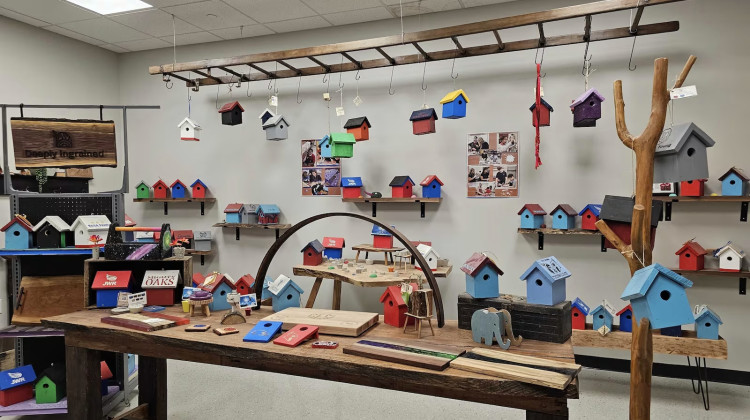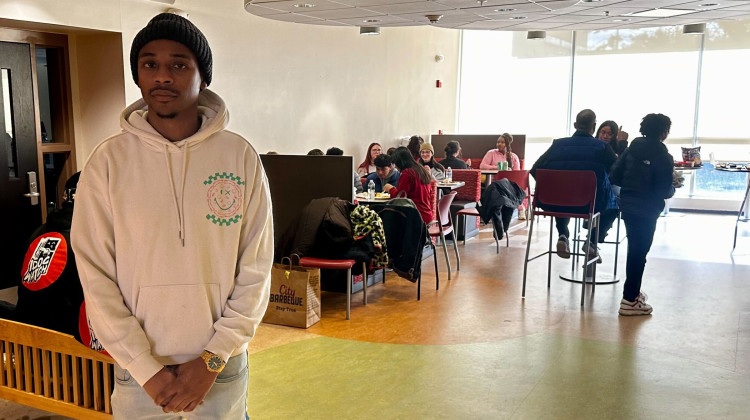
Birdhouses in the woodshop of James Whitcomb Riley Success Academy in Perry Township Schools.
Aleksandra Appleton / Chalkbeat IndianaThis article was co-published by Chalkbeat Indiana and WFYI as part of a partnership to increase coverage of township school districts in Marion County. Have a tip or story idea about a township school district? Email in.tips@chalkbeat.org and tips@wfyi.org or fill out this form.
At first, it’s not clear what birdhouses have to do with student discipline.
A half dozen of them welcome visitors to James Whitcomb Riley Success Academy. Another dozen line the hallways. Plaques in the woodshop reveal that each colorful house was built by a student for a teacher who has made an impact on their lives.
Students come to J.W.R. after running into trouble at their home Perry Township middle schools. Some are facing expulsion. Others are invited to attend as a preventative measure after a string of discipline referrals or excessive absences.
The birdhouses are a hallmark of the school’s service learning program, which sees a small cohort of students every quarter work on philanthropic projects in order to build leadership and cooperation skills during a critical age for development when behavior incidents may spike.
The need for similar programs may grow as lawmakers seek solutions following concerns from teachers across the state and nationwide about student behavior since COVID.
Both in-school and out-of-school suspensions spiked in Indiana in 2022 after a drop in 2021, according to data from the Indiana Department of Education compiled by the Fairbanks Foundation, an Indianapolis-based nonprofit.
In Marion County districts alone, many middle schools had higher rates of discipline incidents than other types of schools within the same district. Southport Middle School in Perry Township, for example, had an in-school suspension rate of 23.3%, or 306 students, over twice that of Southport High School at 9% and 187 students in 2022.
Indiana lawmakers have now taken notice, with bills on disruption, cell phone use, and absenteeism all filed in the Statehouse this year.
House Bill 1262, authored by Rep. Vernon Smith and backed by the Indiana State Teachers Association, originally allowed schools to suspend chronically disruptive and defiant students. Lawmakers intend to amend the bill to instead create a committee to study student discipline.
Smith said he brought the bill after discussions with teachers. Ongoing issues with behavior are also beginning to worsen teacher recruiting and retention, he added.
“You spend so much time on behavior problems that you don’t have time to teach,” Smith said.
In Marion County districts, many middle schools had higher rates of disciplinary incidents than other types of schools within the same district.
The goal of the program at J.W.R., school officials say, is to make a positive impact on students’ behavior that stays with them long after the challenging years of middle school.
“We’re going to spend the time with the student whether it’s now or later,” said Joe Shelburn, the school’s director. “We’d rather do it now, when we can be positive, as opposed to coming up with our best list of consequences further down the line.”
Middle school is a time of development
Advocates say discipline should be done with the intent to teach, not punish.
This may be especially true in middle school.
Students experience rapid physical, mental, and psychological development during the middle grades, said Katie Powell, director for middle level programs at the Association for Middle Level Education. They have new and unique social emotional needs educators should be aware of when it comes to discipline.
“So much of our development as human beings is taking place in early adolescence,” Powell said. “We can have healthier high schoolers and adult citizens if we have healthy and successful middle schoolers.”
They begin to realize that not everyone in their class is their friend, Powell said. But they may not yet have the skills to properly navigate these changing social situations.
“It’s hard to solve systems of equations when your best friend said ‘I’m not your best friend anymore,’” Powell said. “Until students feel safe, until students feel included, they’re not going to see academic growth.”
All the changes of adolescence are in full force in sixth to eighth grade, said Shelburn, when students find themselves in larger schools with more freedom and responsibility. While some misbehavior is expected, it crosses the line when it begins to impact others, he added.
Alternative middle schools like J.W.R. can create positive school communities for students who need them, Powell said.
The J.W.R. program runs quarterly and serves as an alternative to expulsion for many students.
Most students and their parents accept the offer to attend J.W.R., Shelburn said. There’s only one chance to attend — students who get in trouble again complete a separate, virtual program. Students who are on the verge of expulsion participate in the morning class, while the afternoon class includes students with various disciplinary issues.
Throughout the quarter, students work solo and in groups in the woodshop, earning badges as they master tools and skills. While the birdhouses are a signature project, students have also made windchimes for Perry staffers who have lost a loved one.
This year, through grants by the Perry Township Education Foundation, they proposed and executed their own philanthropic projects. Students made funding presentations to the foundation and then purchased materials for their work.
The initial ideas were lofty, like curing cancer, said Shelburn, the school’s director. Teachers helped them set more realistic goals. They fixed drywall and lunchroom seats in elementary schools, filled backpacks with supplies, and volunteered at a district Shop with Cops event.
All of these initiatives serve to put the students in leadership roles, said Shelburn, and lead to a sense of investment in their education, which in turn improves behavior.
“There’s a difference between doing things because they want to and because it’ll make their teachers happy,” he said.
‘Embrace them for who they are’
The semester at J.W.R. ends with student presentations to their parents, teachers, and the larger community on what they’ve learned, which Shelburn said provides a much-needed sense of achievement for students who struggle to get to the finish line.
Speaking at the December graduation, Janmel said she saw the school as a second chance to be a better student. The teachers had helped her understand what to do when she felt angry. They taught her to have goals and work hard.
After nine weeks at J.W.R., Janmel’s mother, Janjai Roberts, said the middle schooler was happier and in better control of her emotions.
“It helps the kids be who they are and be successful,” Roberts said. “That’s what I want for my kids.”
Every student sees growth from the time they first set foot in the school to when they graduate at the end of the semester, but the change is different for every student, said teacher Rodney Claiborne.
Remember to stay calm, he told Janmel as she said goodbye — no running or screaming when things get tough.
J.W.R. teachers and staff often see their graduates again when they visit Perry high schools to reaffirm to students that they’re still in their corner, Shelburn said.
While middle school can present challenges, it’s also an ideal time to address behavior issues before such problems get harder to remedy.
“Rather than try to fix them, we need to embrace them for who they are,” he said.
Aleksandra Appleton covers Indiana education policy and writes about K-12 schools across the state. Contact her at aappleton@chalkbeat.org.
Chalkbeat is a nonprofit news site covering educational change in public schools.
 DONATE
DONATE






 Support WFYI. We can't do it without you.
Support WFYI. We can't do it without you.